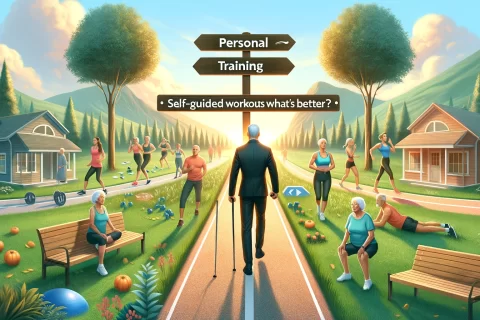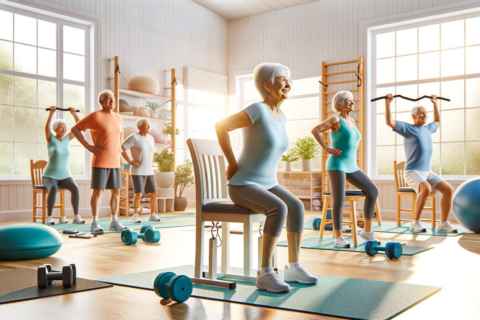Introduction
Good sleep is crucial at any age but achieving restful nights becomes increasingly important as we grow older. For seniors, sleep challenges are not uncommon, yet the benefits of a good night’s rest can significantly enhance the quality of life. This detailed guide offers practical tips for better sleep, tailored specifically for seniors. From establishing a sleep-conducive environment to understanding the impact of diet and exercise, we will explore a range of strategies to help seniors improve their sleep quality.
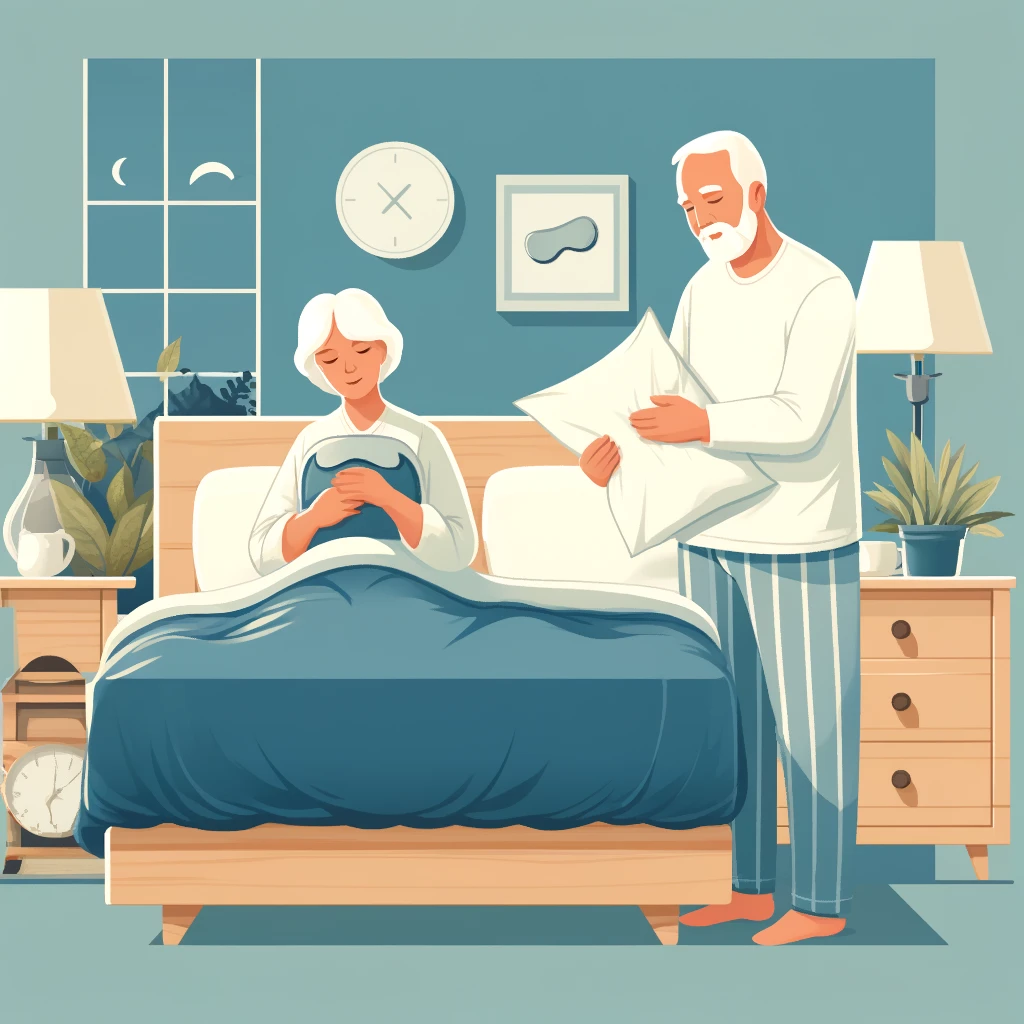
Understanding the Importance of Sleep for Seniors
Sleep is a fundamental aspect of health that impacts numerous bodily functions, especially as we age. For seniors, getting adequate sleep is not just about feeling rested. It’s about maintaining and enhancing overall health and quality of life.
Here are several key reasons why sleep is particularly important for older adults:
Physical Health Maintenance
During sleep, the body undergoes repair and regeneration processes that are crucial for physical health. This includes the repair of heart and blood vessels, which is essential for preventing heart disease and high blood pressure.
Enhanced Immune Function
Adequate sleep is vital for a robust immune system. A well-rested body is more efficient at fighting off infections, which is particularly important for seniors who may have a diminished immune response due to age.
Cognitive Function and Memory
Sleep plays a critical role in brain health. It helps consolidate memories, meaning experiences and information learned during the day are processed and stored during sleep. Good sleep can help maintain cognitive functions and reduce the risk of dementia.

Emotional and Mental Well-being
Sleep significantly affects mood and mental health. Lack of sleep can lead to irritability, stress, and depression. Ensuring regular, restful sleep helps maintain emotional balance and enhances overall well-being.
Pain Management
Quality sleep can help reduce the perception of pain, which is particularly beneficial for seniors dealing with chronic pain conditions like arthritis. A good night’s rest can make a significant difference in pain levels and overall comfort.
Weight Management
Sleep affects the hormones that control appetite. Lack of sleep can lead to increased hunger and appetite, potentially leading to weight gain. Maintaining a healthy weight is crucial for seniors to manage health issues like diabetes and heart disease.
Tips for Better Sleep: Creating the Right Environment
Optimize Your Sleep Environment
Creating the right sleep environment is crucial for improving sleep quality, especially for seniors. Here are key elements to focus on:

- Control Light Exposure: Use blackout curtains or eye masks to minimize light, and avoid electronics before bedtime to reduce blue light exposure, which can disrupt melatonin production.
- Maintain a Cool Room Temperature: The ideal bedroom temperature for sleep is between 60-67 degrees Fahrenheit. Cooler temperatures help signal the body it’s time to sleep.
- Invest in Quality Bedding: Ensure your mattress and pillows provide good support and comfort. Proper bedding can prevent pain and discomfort that disturb sleep.
- Minimize Noise Distractions: If noise is an issue, consider using a white noise machine or earplugs to help create a quieter sleep environment.
- Aromatherapy: Introducing calming scents like lavender or chamomile through diffusers or scented candles can also aid in relaxation and improve sleep readiness.
Establish a Relaxing Pre-Sleep Routine
A consistent pre-sleep routine can signal to your body that it’s time to wind down and prepare for sleep. Here are key components of an effective bedtime ritual, tailored for seniors to cultivate optimal sleep habits:

- Disconnect from Digital Devices: Engaging with digital screens can stimulate the mind and interfere with the body’s natural sleep-wake cycle. Establish a habit of turning off all electronic devices at least an hour before bed to help your mind unwind.
- Relaxation Techniques: Incorporate relaxation techniques such as deep breathing, meditation, or gentle yoga stretches into your nightly routine. These practices can reduce stress and physical tension, making it easier to fall asleep.
- Reading or Listening to Soft Music: Instead of watching TV or browsing the internet, opt for reading a book or listening to calm, soothing music. These activities can significantly relax your mind and prepare it for sleep without the stimulating effects of light from electronic devices.
- Warm Bath or Shower: Taking a warm bath or shower before bed can help lower your body’s core temperature afterward, which signals the body that it’s time to sleep. Additionally, the warmth can be soothing and relaxing, further aiding the transition to sleep.
- Herbal Teas: Drinking a cup of herbal tea such as chamomile or valerian root can be a soothing part of your bedtime routine. These herbs are known for their natural sedative properties and can help calm the nervous system.
Dietary Tips for Better Sleep
Watch Your Diet
What you eat can have a significant impact on how well you sleep. To promote better sleep, avoid large meals, caffeine, and alcohol close to bedtime. Instead, focus on a balanced diet that includes sleep-promoting foods rich in magnesium, such as almonds and bananas, or calcium, like yogurt and cheese. These minerals help the body produce melatonin, which regulates sleep.

Diet plays a crucial role in how well you sleep, particularly in the hours before bedtime:
- Avoid Heavy Meals and Stimulants: Eating large, rich meals can cause discomfort and keep you awake. Similarly, stimulants like caffeine and nicotine should be avoided in the late afternoon and evening as they can significantly hinder your ability to fall asleep.
- Incorporate Sleep-Inducing Foods: Foods rich in magnesium, such as almonds and spinach, and those high in calcium like yogurt and milk, can promote better sleep by helping the body produce melatonin, the sleep hormone.
Stay Hydrated, But Not Too Late
Staying hydrated is essential for your overall health but drinking too much liquid close to bedtime can lead to frequent trips to the bathroom throughout the night. Try to limit fluids a couple of hours before you go to bed to minimize disruptions.
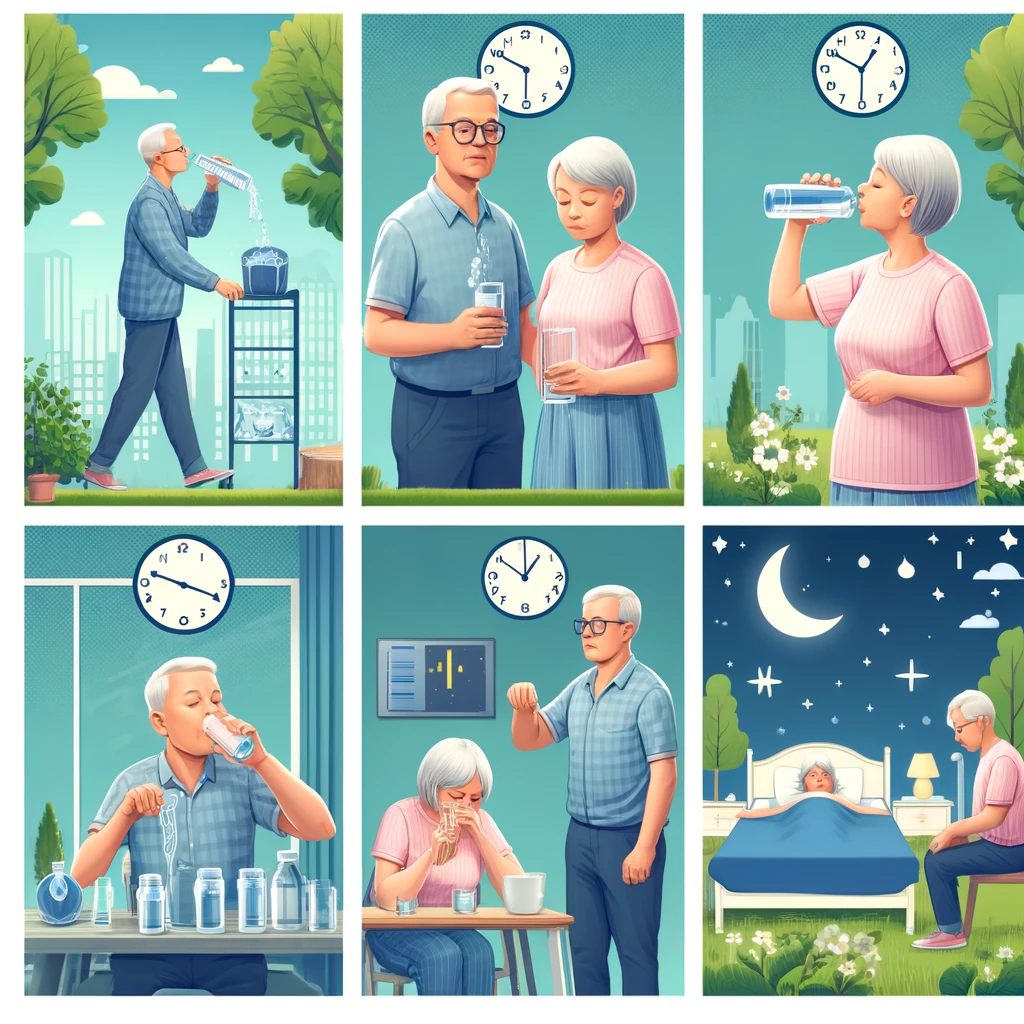
Hydration is essential, but timing is key to avoid disrupting your sleep:
- Monitor Fluid Intake: While staying hydrated is crucial, it’s important to reduce fluid intake in the evening to minimize nighttime bathroom trips, which can interrupt sleep.
- Balanced Hydration: Aim to get most of your daily water intake earlier in the day to avoid being overly full before bed.
Exercise and Its Impact on Sleep
Regular, Moderate Exercise
Exercise is one of the most recommended tips for better sleep. Regular physical activity can help you fall asleep faster and enjoy deeper sleep. However, timing is important; exercising too close to bedtime can be stimulating. Try to schedule exercise at least three hours before bed. Activities like walking, tai chi, or gentle yoga can be particularly beneficial for seniors.

Regular exercise can improve sleep quality, but it should be appropriately timed:
- Engage in Regular Physical Activity: Activities like walking, swimming, or light aerobic exercises enhance overall fitness and help you fall asleep faster and deepen your sleep.
- Avoid Late Evening Workouts: Exercising stimulates the body and can make sleeping more difficult if done too close to bedtime. Plan workouts for earlier in the day.
Balance Activity and Rest
While exercise during the day is beneficial, it’s also important to balance activity with relaxation. Learn to listen to your body and incorporate periods of rest throughout the day to avoid overtiring yourself, which can be counterproductive to good sleep.
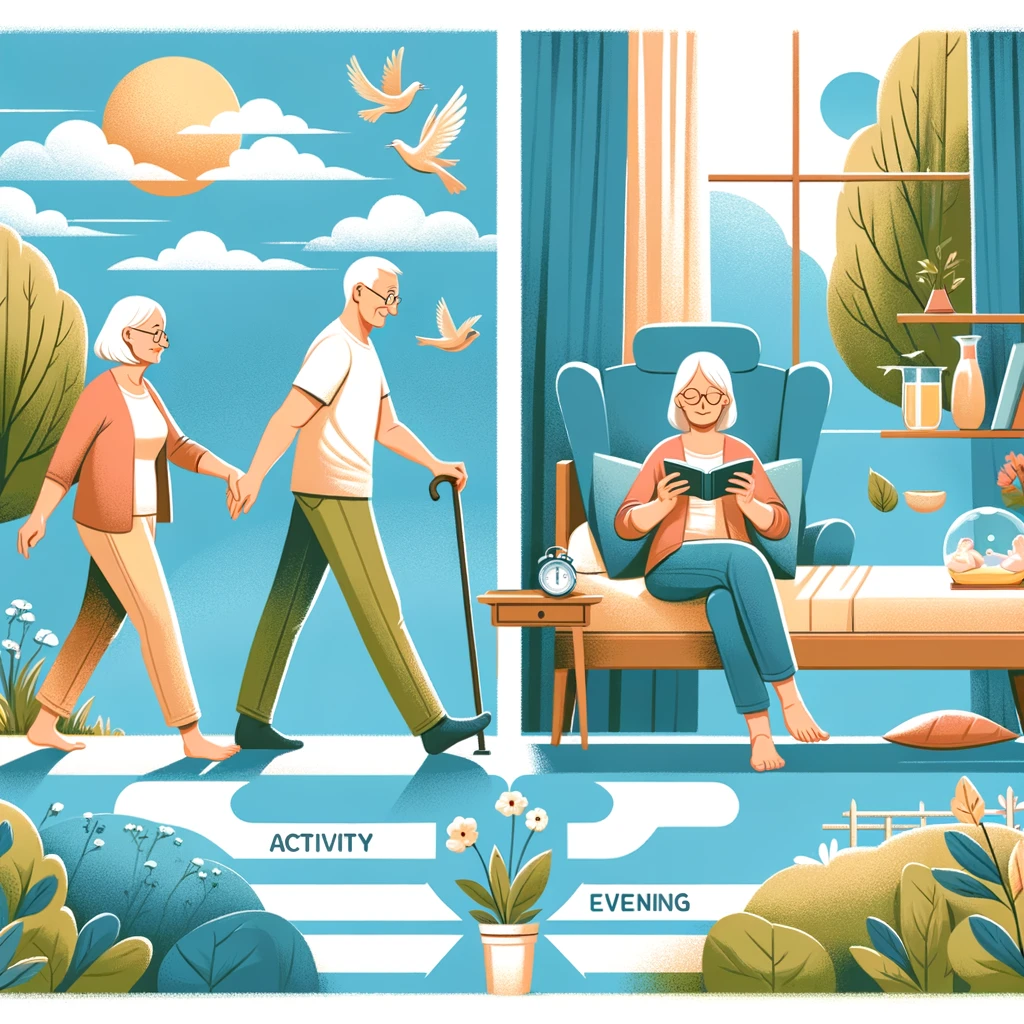
Balancing daily activities with adequate rest is vital for good sleep:
- Plan for Downtime: Active days should be balanced with calm evenings. An evening routine that promotes relaxation can prepare your body for sleep.
- Listen to Your Body: Recognize when you’re feeling tired and allow yourself to rest. Overexerting yourself can lead to poor sleep quality.
Psychological Strategies
Mindfulness and Meditation
Mindfulness and meditation can significantly improve sleep by reducing stress and anxiety. Techniques such as guided imagery, deep breathing exercises, or progressive muscle relaxation can be done before bedtime to prepare the mind and body for sleep.

Integrating mindfulness and meditation into your evening routine can greatly enhance your sleep:
- Daily Practice: Engaging in mindfulness or meditation can help calm the mind and reduce stress, making it easier to fall asleep and improve sleep quality.
- Meditative Exercises: Techniques like deep breathing, progressive muscle relaxation, or guided meditations can be performed before bed to help transition into sleep.
Cognitive Behavioral Therapy for Insomnia (CBT-I)
CBT-I is a structured program that helps you identify and replace thoughts and behaviors that cause or worsen sleep problems with habits that promote sound sleep. Consider consulting a specialist if sleep issues persist.

CBT-I is an effective approach for those struggling with insomnia:
- Behavioral Adjustments: This therapy helps identify and modify behaviors and thoughts that contribute to sleep problems.
- Professional Assistance: Working with a therapist can provide strategies tailored to your specific sleep issues, teaching you how to establish a healthy sleep pattern.
Incorporating Technology
Several smartphone applications can help track sleep patterns and provide personalized tips and relaxation techniques. These tools can be very helpful in identifying habits that are detrimental to sleep and providing guidance on improving sleep hygiene.

Leveraging technology can also support better sleep habits:
- Sleep Tracking: Apps can help monitor your sleep patterns and provide insights that might reveal habits or trends that are detrimental to good sleep.
- Relaxation Features: Many apps offer features such as bedtime stories, soothing sounds, or sleep-friendly meditations that can make falling asleep easier.
Conclusion: Embrace the Night with Confidence
Implementing these tips for better sleep can make a significant difference in the sleep quality of seniors, leading to improved health, mood, and overall quality of life. Remember, consistency is key when it comes to developing healthy sleep habits.
About Steve Allison
Steve Allison, an experienced personal trainer and nutrition specialist for seniors with certifications from NASM, emphasizes the importance of holistic approaches in addressing sleep issues. His expertise in fitness and nutrition plays a vital role in helping seniors achieve a balanced lifestyle that promotes optimal sleep. For more resources and personalized advice, visit TheFitnessHelpDesk.com.










